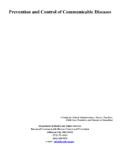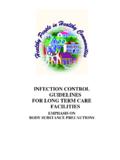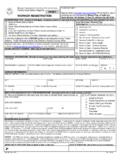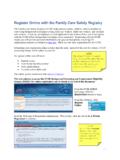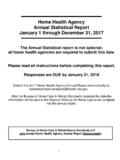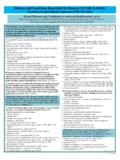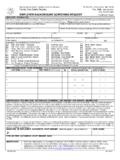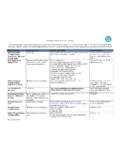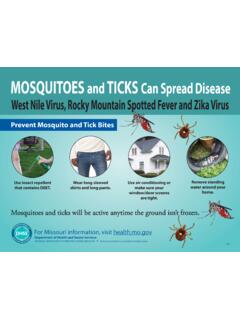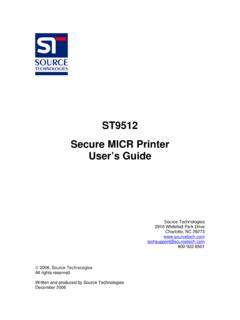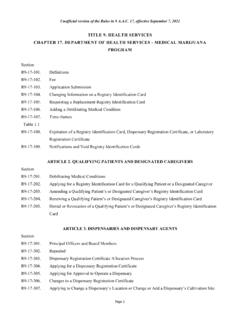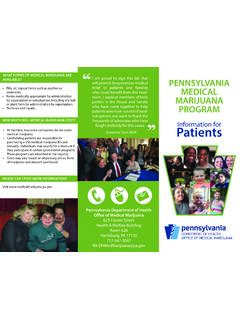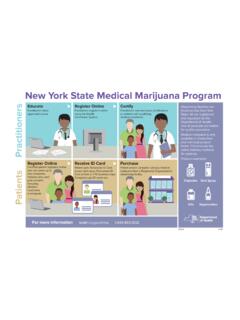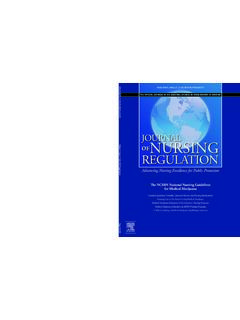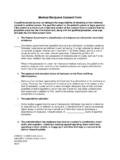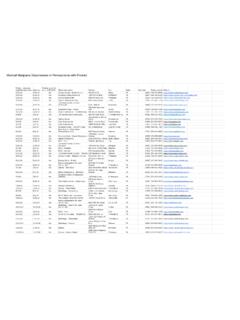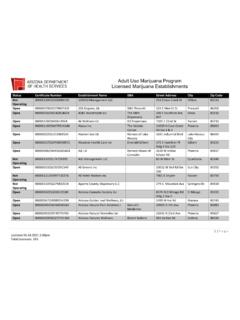Transcription of Medical Marijuana in Missouri
1 Patient InformationMedicalMarijuanain MissouriWhat you need to for Medical Marijuana RegulationMissionTo administer Missouri s Medical Marijuana Regulatory Program in alignment with the provisions of Article XIV of the Constitution, as determined by the will of the citizens of program that provides safe and secure access to Medical Marijuana for qualifying Missouri patients through consistent regulation, enforcement, and Missouri Department of Health and Senior Services (DHSS),Section for Medical Marijuana : number - 573-751-6234(8:00 5:00 , Monday-Friday)Toll-free Call Center - 866-219-0165(8:30 3:30 , Monday-Friday)Article XIV Section 1.
2 Right to access Medical Marijuana Article XIV allows state-licensed physicians to recommend medicalmarijuana for certain qualifying conditions, provides patients theright to discuss possible benefits of Medical Marijuana , andestablishes a patient s right to use Medical Marijuana under thesupervision of a Marijuana in Missouri refers to any strain of cannabis with a tetrahydrocannabinol (THC) content of greater than on a dry weight basis. Products containing forms of cannabis or hemp or chemicals from cannabis or hemp that do not contain this amount of THC are not considered Medical Marijuana in Missouri . Medical Marijuana can be used in different ways; each way canaffect users differently, whether inhaled ( , smoking, vaporization), oral ( , edibles, tinctures, capsules, oils),sublingual (applied under the tongue , tinctures, dissolvable strips, lozenges, sprays), or topicals ( , lotions, salves, bath salts, oils).
3 There is no reciprocity between Missouri s Medical Marijuana Program (MMMP) and other state Medical Marijuana programs. Individuals licensed in another state do not automatically qualify for a license in though Medical Marijuana is legal in Missouri , Marijuana possession remains a federal offense. Federal law applies to offenses committed on federal property, including all national parks, military property and other land under federal control. Federal law also applies to offenses involving interstate commerce and importation from other qualifying patient is a Missouri resident diagnosed with at least (1) of the qualifying Medical Medical conditions: Cancer.
4 Epilepsy. Glaucoma. Intractable migraines unresponsive to other treatment. A chronic Medical condition that causes severe, persistent pain or persistent muscle spasms, including but not limited to those associated with multiple sclerosis, seizures, Parkinson s disease and Tourette s syndrome. Debilitating psychiatric disorders, including, but not limited to, post-traumatic stress order, if diagnosed by a state licensed psychiatrist. Human immunodeficiency virus or acquired immune deficiency syndrome. A chronic Medical condition that is normally treated with a prescription medication that could lead to physical or psychological dependence, when a physician determines that Medical use of Marijuana could be effective in treating that condition and would serve as a safer alternative to the prescription medication.
5 A terminal illness. In the professional judgment of a physician, any other chronic, debilitating or other Medical condition, including, but not limited to, hepatitis C, amyotrophic lateral sclerosis, inflammatory bowel disease, Crohn s disease, Huntington s disease, autism, neuropathies, sickle cell anemia, agitation of Alzheimer s disease, cachexia and wasting Primary Caregiver is someone who is 21 years of age or older and who is responsible for managing the well-being of a qualified can designate up to two caregivers while caregivers can have up to three patients. Qualified patient(s) and their caregiver(s) must be licensed by DHSS.
6 Caregivers must be listed as the caregiver for that particular qualified patient on the primary caregiver s application for an identification (ID) card and on the licensed qualified patient s approved application. Caregivers must submit a Patient Authorization Form with their caregiver application. The Patient Authorization Form, found on the DHSS website, must be completed and signed by the qualified fees for patient and caregiver ID cards Annual and renewal fee for patient and caregiver cards $ Annual and renewal fee for a home cultivation card $100. Only the patient or their caregiver, not both, may be authorized for home cultivation.
7 See page 8 for more information about home cultivation security regulations that must be followed. DHSS accepts electronic check, MasterCard, Visa, Discover, American Express and any gift card issued by those credit cards. All license fees are non-refundable and patient and caregiver licenses are valid for one year. 3 DesirableStep 1: Talk to your doctorregarding the use and possible benefits of Medical Marijuana . Be direct and ask your doctor if Medical Marijuana is right for are some questions to consider asking your physician regarding Marijuana use: What benefits can be expected from Marijuana therapy? What are the risks related to Marijuana therapy?
8 Do the known benefits outweigh the risks? Will Marijuana therapy affect the use of any medications I m currently taking? What side effects can be expected? Will Marijuana therapy be covered by health insurance?For more information on possible health effects associated with Marijuana usage, refer to the Centers for Disease Control and Prevention s (CDC) must visit a Missouri -licensed physician, who is active and in good standing to practice medicine or osteopathy, to obtain a physician certification. The Physician Certification Form must be completed in its entirety and signed by the Physician Certification Form must be issued no more than 30 days prior to patients submitting their online applications.
9 While Article XIV allows Missouri -licensed physicians to discuss and recommend Medical Marijuana for their patients, the Constitution does not mandate physicians do so as part of their practice. If your physician won t complete the Physician Certification Form, ask if they would be willing to refer you to a physician who does not maintain a list of certifying qualifying patient should consider keeping a Marijuana -use log to establish an ideal Marijuana treatment regimen. Periodically reviewing the log can help you and your physician make decisions about what works best for 2: Submit a complete patient or caregiver application using the secure, online MMMP patient registry accessed from the DHSS or mailed applications, documents and/or payments will not be accepted and will be returned to the applicant by certified following items are required in order to have a complete application: Identifying information: name, date of birth, social security number.
10 Contact information: residence address, mailing address or place where qualifying patient can receive mail, email address and phone number. Proof of Missouri residency: a copy of a valid Missouri driver s license, a Missouri issued ID Card, a current Missouri motor vehicle registration, or a recent Missouri utility bill. A legible copy of the qualifying patient s photo ID issued by a state or federal government entity. A completed Physician Certification Form for a patient application, a Patient Authorization Form for a caregiver application, or a Parental/Legal Guardian Consent Form for non-emancipated qualifying patient.
